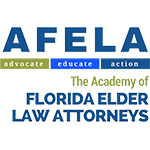Asset Transfer Advice
To determine eligibility, the Veterans Administration considers income and unreimbursed medical expenses. Asset transfers are not considered. For example, if you give $50,000 to your daughter on Tuesday and apply for V.A. benefits on Wednesday, the $50,000 transfer will not be considered. That's a very different approach from Florida Medicaid, which carefully examines asset transfers. Currently, Florida Medicaid applies a five-year look-back period on transfers.
Many veterans who apply for Aid and Attendance benefits will ultimately apply for Medicaid benefits. When you apply for Medicaid, those prior asset transfers may become a "Medicaid Time Bomb" resulting in denial of Medicaid benefits.
To avoid the Medicaid Time Bomb, be sure to consult with our Certified Elder Law Attorneys before you apply for Veterans benefits. We can devise a coordinated approach that will allow you to secure the maximum Veterans benefits and Medicaid benefits you're entitled to.
Wartime Periods
• World War II: Dec. 7, 1941 - Dec. 31, 1946. Extended to July 25, 1947 if the Veteran was in service on December 31, 1946. Continuous service before July 26, 1947 is considered World War II service.
• Korean conflict: June 27, 1950 – January 31, 1955
• Vietnam era: August 5, 1964 – May 7, 1975 and from February 28, 1961 – May 7, 1975 in the case of a veteran who served in the Republic of Vietnam during that period.
• Persian Gulf: August 2, 1990 - yet to be determined.
• National Guard: does NOT count as Military Service unless under Title 32.
*Benefits are retroactive to the first of the month the claim for benefits has been filed. There is a new federal policy where they may be able to go back 12 months for nursing home applications
Veterans Monthly Pension Rates
Veteran's Family Situation / Max Monthly Pension / Max Pension with Aid & Attendance
Veteran / $1097 / $1830
... with 1 dependent / $1436 / $2169
Widow of Veteran / $735 / $1176
... with 1 dependent / $963 / $1403
Veteran Permanently Housebound / $1340 / n/a
... with 1 dependent / $1680 / n/a
Widow Permanently Housebound / $899 / n/a
... with 1 dependent / $1126 / n/a
Aid & Attendance
Our Florida veterans benefits lawyers advise disabled and elderly veterans and their surviving spouses about qualifying for benefits for long-term care. Pension with Aid and Attendance is a little-known veterans benefit and contrary to popular belief, this benefit is not service-connected. This benefit is available to eligible veterans and their widows/widowers to help pay for at-home care, nursing home care, or assisted living care.
Our V.A.-accredited lawyers can advise you about eligibility requirements, as well as help you coordinate with your estate plan and other benefits to which you may be entitled in the future, for example, Florida Medicaid benefits for long-term care.
There are income limits for Aid and Attendance benefits. However, even veterans whose income exceeds the allowable amount may qualify if unreimbursed medical expenses, once deducted, bring the income below the maximum level.
V.A. Pension with Aid & Attendance Benefits: Eligibility Criteria For Veterans
• Veteran was discharged from service under conditions other than dishonorable.
• Veteran served at least 90 days of active military service, 1 day of which was during a wartime period (see Wartime Periods below).
• If veteran entered active duty after September 7, 1980, generally he/she must have served at least 24 months or the full period for which called or ordered to active duty (although there are exceptions to this rule).
• Veteran’s countable family income must be below a yearly limit set by law. However, unreimbursed medical expenses - which may include the cost of a nursing home or assisted living facility or in-home assistance, as well as other medical expenses - are deducted when calculating income.
• Veteran is age 65 or older, OR, permanently and totally disabled, not due to willful misconduct
• Allowable assets not to exceed $80,000 (effective Dec. 2013). Note that asset transfers are NOT considered.* For example, if you give $50,000 to your daughter on Tuesday and apply for V.A. benefits on Wednesday, the $50,000 transfer will not be held against you.
*On Jan. 26, 2015, the V.A. introduced a proposal to establish a look-back period for asset transfers. If that proposal becomes law, many of the transfer, asset and income rules will change.
V.A. Pension with Aid & Attendance Benefits: Eligibility Criteria For Veterans Survivors and Dependents
• Surviving spouse must not have remarried.
• Children must be under age 18, or under age 23 if attending VA-approved school or have become permanently incapable of self-support because of disability before age 18 (unless the child marries or income exceeds applicable limit).






